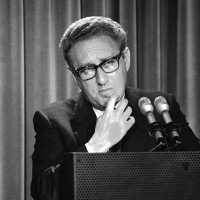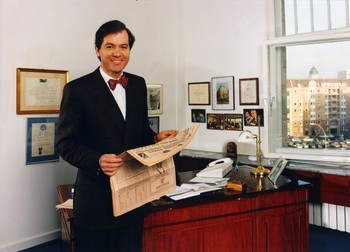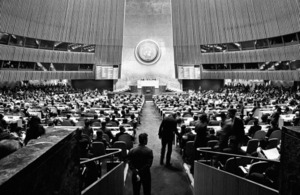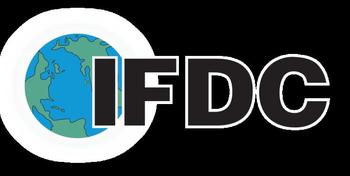Note: Our accounts contain the personal recollections and opinions of the individual interviewed. The views expressed should not be considered official statements of the U.S. government or the Association for Diplomatic Studies and Training. ADST conducts oral history interviews with retired U.S. diplomats, and uses their accounts to form narratives around specific events or concepts, in order to further the study of American diplomatic history and provide the historical perspective of those directly involved.
Words are the tools of diplomacy. When done well, high-flung rhetoric can help define an era. With a foreign policy doyen like Henry Kissinger, the stakes were even higher, as he viewed speeches as not just a means to enunciate existing policy, but an opportunity to create new policy.
Mark Palmer discusses in an interview with ADST in 1994 what it was like toiling in the crucible that was Kissinger's State Department.
Read the entire account on ADST.org. This account was edited by C. Bradley.
PALMER: I said to [Assistant to Kissinger at the NSC; later Under Secretary of State for Political Affairs Larry] Eagleburger that I wanted a chance to be Kissinger's speechwriter. Larry said no, that Henry had already hired some journalist who he knew to be his speechwriter as Secretary. I said, nonetheless, I wanted to meet him and make my case.
Larry said fine. So I was brought in on a Sunday. Kissinger ignored me when I came in, I remember. Anyway, finally Larry insisted on his paying attention to my being in the room. And he laughed and he said with great condescension, "This is really a ridiculous idea, the person who was [Secretary of State] Bill Rogers' speechwriter being my speechwriter. We are totally different and obviously his speechwriter cannot write for me." He treated this as just a joke.
I'm a Vermonter and I'm not shy and so I said, "I've read all of your books. I've virtually memorized them. I am certain that I can write in your style. And I am a Foreign Service officer and we have a right to be considered for any position and you've got to give me an opportunity to write one speech for you. If I fall on my ass, I'll go away quietly. But you've got to give me a chance to write one speech for you." And I knew what his first speech was going to be.
He turned to Larry and he said, "Who is this asshole?"
And Larry said, "You should give him a chance." So Kissinger sort of dismissively said, "Okay, you can write something." And I had the feeling that he wasn't even going to read it.
I went home. About two hours later, still on that Sunday, I got this call which said, "Just a moment for Dr. Kissinger." And I thought it was a friend who knew that I was over there and that it was a joke.
So somebody comes on with this German accent and starts to talk to me about the first speech and I was just about to say, "Oh, go bug off!" because I was so tense. And actually it was him.
So we talked about his first speech and I did a draft. He called me in very quickly thereafter and we started working....Then I went on for three years and I kept trying to hire help, because I not only wrote his speeches, I wrote Nixon's and Ford's, and a lot of other people's, and ended up being the speechwriter on foreign affairs. Every time Henry figured out that I'd hired somebody to help me, he would fire them. So I had three very intense years doing his speeches and other peoples'.
Kissinger wanted to control everybody's statements on foreign affairs, so he insisted that I write all the initial stuff for everybody....
Henry thought that speeches were a way of creating policy, not just enunciating existing policy, but of creating new policy, of making history.
That first time I met him, among his arguments for why I couldn't do this job, he said, "You Foreign Service officers think everything that matters is in Africa and the U.N. and I want to tell you that's not my view of things. What I believe matters is China and the Soviet Union, nuclear balance, and Japan and Western Europe, NATO, and that's it."
I remember saying to myself, "You're wrong and you're going to learn that you're wrong as Secretary; that stuff happens and that the stuff that happens is elsewhere. And you're going to end up working on a lot of stuff that you've never thought about before."
Anyway, my favorite story...was at the Sixth Special Session of the U.N. where he was supposed to address all kinds of Third World issues.
Somebody had told me...that there was a real problem with Western fertilizers for the Third World. They were too expensive, burned the fields if misused, etc. He thought that we ought to set up an institute to do research in fertilizer developed specially for Third World purposes.
So I put that in the first draft of the Sixth Special Session, an institute for fertilizer. Kissinger looked at this and he said to me, "This is a terrible proposal that you've got in here. This is not at my level." He said this will become known as the Henry A. Kissinger Memorial Bullshit Institute. (Laughter) Fertilizer: bullshit.
And so anyway, I did the second draft of the speech. I still was being told that this was an important thing to do so I put it back in again. He got really annoyed that it was in there and he said, "Oh no. I'm going to be the laughingstock and I can't do it. Take it out." I put it in the third draft and he got really annoyed and said, "I'm going to fire you if you put it in again."
So I went to Peter Rodman, who had been Kissinger's graduate assistant at Harvard and who came to the Policy Planning staff. He was almost like a son for Henry and really understood Henry in a way that no one else did. He was also a good friend and had been immensely helpful to me on speeches.
I went to Peter and said, "I'm at my wits' end. You know Henry much better than I do. I'm convinced that this is the right thing on the merits to have this institute, but he will not put it in. I know if I put it in he's going to fire me. He was really, really angry."
So Peter said, "Well, the whole trick with Henry is you've got to come up with the words that he's using this week, the 'flavor of the month' words, so let's make a list." We knew what he was into at the moment. He was into action plans. He loved "comprehensive." You know, there were a bunch of words so we made a list.
We came up with comprehensive research action program for fertilizer. So I put that in. And Henry said, "Oh, wonderful! Why have you been wasting all my time with this other stuff with this institute? This looks good! Comprehensive research action program."
So we went on, draft after draft, and this stayed the same, until about two days before we were leaving to go up to New York to give the speech. Larry Eagleburger had seen from the beginning that the acronym of comprehensive research action program was CRAP (laughter). And of course we'd done that on purpose.
So Larry said, "Okay, you've done this joke now for all these drafts, but now you've got to get it out of there. You can't have him get up and say "crap."
I said, "Well, you tell him; because we've got to do something. And I'm not going to back off and we're going to do this institute."
Larry said, "No, no. This is your responsibility. You got in this mess. You're going to have to tell him." So I was scared. So I didn't do anything. We were on the plane flying up to New York. Of course, I realized I couldn't actually let him get up that afternoon and say this.
So I said, "Mr. Secretary, we've really got to focus on this part of the speech again because it's got to be changed. We've got to change it," I said. "Will you please look at it?"
He looked at it and he finally saw the acronym CRAP. He was so pissed off. He was so pissed off that he couldn't speak, you know, that we had done this to him. And he didn't say anything. He just was really, really angry and didn't say anything.
Fortunately, he had taught me to always keep the early drafts of every speech. So I had the first draft with me. So I went back and I put in this fertilizer institute. He got up like three hours later and announced that we were going to establish this fertilizer institute! (Laughter)
And AID [the U.S. Agency for International Development] funded it. $40 million. [Note: The International Fertilizer Development Center was established in 1974 and focuses on the development and transfer of effective and environmentally sound crop nutrient technology and agribusiness expertise.]
